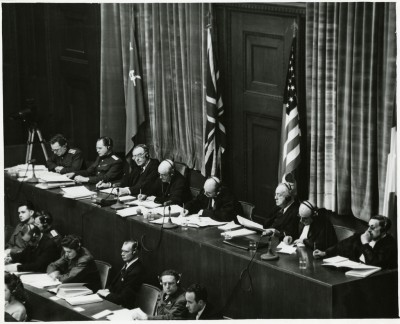War Crimes: Were the Nuremberg Tribunals Only Victors’ Justice?

On the surface, The Nuremberg Tribunals were a court assembled by the victors which prosecuted the losers. It is also true Axis war criminals were tried though Allied war criminals were not. But there was a greater concern at the time about stopping wars of aggression than prosecuting individual war criminals, since no one thought the world could survive one more world war. The intent was not retribution but to find a new way forward. The Tribunal in its Judgment said “Crimes against international law are committed by men, not by abstract entities, and only by punishing individuals who commit such crimes can the provisions of international law be enforced.”
Nuremberg was starkly different from the typical case of victor’s justice of the time. With Nuremberg the victors turned away from the accepted vindictive punishment of the vanquished. The motivation to punish those who started a war which killed seventy two million, including sixty one million on the victor’s side, was immense. Justice Robert Jackson, US Supreme Court Justice and the main architect of the Nuremberg Tribunals, said in the opening statement of the Tribunals “The wrongs which we seek to condemn and punish have been so calculated, so malignant, and so devastating, that civilization cannot tolerate their being ignored, because it cannot survive their being repeated.” Stalin proposed a suitable deterrent would be executing the top 50,000 living German leaders. Given the wanton killing on the Eastern Front experienced by the Russians, it is easy to understand how he considered this to be appropriate. Churchill countered that executing the top 5,000 would be enough blood to assure it would not happen again.
The victorious powers instead set a new path, one of criminal trials, the Nuremberg and Tokyo Tribunals. Justice Jackson declared “That four great nations, flushed with victory and stung with injury, stay the hand of vengeance and voluntarily submit their captive enemies to the judgment of the law is one of the most significant tributes that Power has ever paid to Reason.”
Acknowledged as imperfect, Nuremberg was an effort to establish the rule of law to deal with sociopathic and despotic leaders and their followers who would start wars of aggression. “This Tribunal, while it is novel and experimental, represents the practical effort of four of the most mighty of nations, with the support of seventeen more, to utilize international law to meet the greatest menace of our times – aggressive war.” said Jackson. The experiment provided that each defendant be indicted, have the right to a defense before a court, similar to a civilian court. And there seems to have been some level of justice since some were found completely innocent, some were only found guilty of some charges and most were not executed. Whether this was just a victor’s court dressed up in fancy trappings of justice or the first faulting steps of a new way forward would depend on what happened in the years after, even what happens now. Some of what is accepted as normal today comes to us from Nuremberg like the terms war crimes, crimes against humanity
Jackson said “We must never forget that the record on which we judge these defendants is the record on which history will judge us tomorrow. To pass these defendants a poisoned chalice is to put it to our own lips as well.” They knew they were only writing the first part of the story of Nuremberg and that others would write the ending. We can answer this question about victor’s justice by looking just at 1946. Or we can take a broader perspective and answer it in terms of today and of the future, in terms of the long term results from Nuremberg.
Whether it was justice only for the benefit of the victors is our challenge. Will we let international law be a tool only for the powerful? Or will we use Nuremberg as a tool for “Reason over Power”? If we let the Nuremberg Principles be used only against the enemies of the powerful it will have been victor’s justice and we will be “putting the poisoned chalice to our own lips.” If instead we, we the people, work, demand and, succeed in holding our own high criminals and government up to these same laws it will not have been a victor’s court. Justice Jackson’s words are an important guide today, “The common sense of mankind demands that law shall not stop with the punishment of petty crimes by little people. It must also reach men who possess themselves of great power and make deliberate and concerted use of it to set in motion evils.”
Going back to the original question – Were the Nuremberg Tribunals only victor’s justice? – that depends on us – that depends on you. Will we prosecute our own high war criminals? Will we respect and use the obligations of Nuremberg to oppose our government’s crimes against humanity and crimes against peace?
Elliott Adams was a soldier, a politician, a businessman; now he works for peace. His interest in international law grew out of his experience in war, in places of conflict like Gaza, and being on trial for peace activism.

